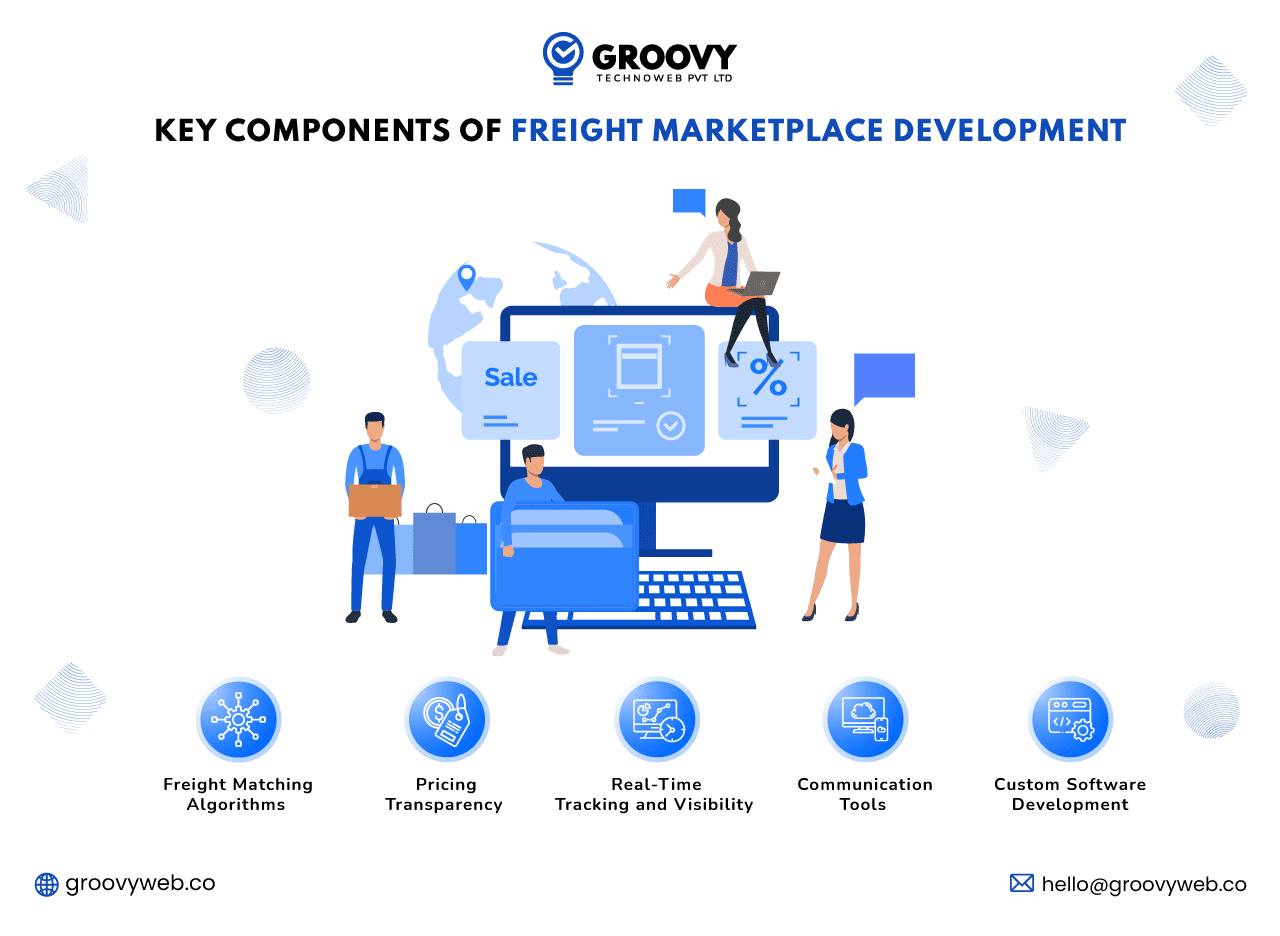Why Freight Marketplaces Are Crucial for the Future of Global Logistics
Rahul Motwani
October 24, 2024 230 Views
Quick Summary : The importance of this digital platform in bridge-creating between shippers and carriers shows freight marketplace development. It is essential because it assists in optimizing shipping processes while reducing costs against operations. This blog discusses shipping management software that helps boost efficiency through automation of freight quoting, real-time tracking, and route optimization. Furthermore, it states the benefits of custom software development for achieving flexibility and scalability in solutions tailored according to the specific needs of logistics companies.
Behind modern commerce lies the global logistics industry, bringing goods across the globe from their producers to their final consumers. Considering that demand for ever-faster, much more efficient, and utterly transparent logistics solutions is increasing, traditional freight systems can’t keep up with it. This leads us to the issue with the development of the freight marketplace.Freight marketplaces connect shippers and carriers in one platform, making operations and communication easier with saved costs and efficiency across the supply chain. These are mainly revolutionizing the logistics industry when combined with shipping management software and Freight marketplace app development. Let’s discuss why freight marketplaces are important for the future of global logistics and how custom software solutions are helping shape this transformation.
What is a Freight Marketplace?
A freight marketplace is an online platform designed to facilitate the transportation of goods by connecting shippers—businesses or individuals who need to move freight—with carriers—transportation providers who can deliver these goods. These digital platforms act as intermediaries, allowing both parties to interact in real time, ensuring that shipments are matched with available carriers based on specific criteria such as weight, size, type, and destination of the cargo.
The key advantage of a freight marketplace is its ability to streamline logistics operations by digitizing what has traditionally been a manual and time-consuming process. Shippers can post their shipping requirements and receive bids or offers from multiple carriers, enabling them to choose the best option in terms of price, speed, or service level. This not only provides transparency but also drives competition, which can result in lower transportation costs for shippers.
How Freight Marketplaces Operate
Freight marketplaces operate similarly to popular ride-sharing apps. Using advanced algorithms and shipping management software, these platforms match available carriers with shippers’ needs in real time. This helps reduce delays, optimizes routes, and fills empty cargo spaces, making the entire supply chain more efficient. The marketplace benefits both parties:
For shippers
It provides instant access to a broad range of carriers, enabling them to find the best rates, delivery times, and routes for their goods. Additionally, many freight marketplaces provide real-time tracking, which gives shippers visibility into where their shipments are at any given moment, improving transparency and customer satisfaction.
For carriers
The marketplace ensures that vehicles are utilized more efficiently by helping carriers avoid empty backhauls (return trips without cargo) and maximize the use of their available space. This increases their operational efficiency and profitability.
What is Freight Marketplace Development?
Freight marketplace development is the process of building and optimizing an online platform to simplify logistics and transport for shippers and carriers. These platforms heavily rely on comprehensive software solutions with basic functionalities, ranging from freight matching, and transparent pricing, to real-time tracking of shipments between shippers and carriers. Businesses can make transportation easier, cheaper, and more efficient throughout their supply chain through well-designed freight marketplaces.
Key Components of Freight Marketplace Development
A highly effective and scalable freight marketplace would include considerations for the following core components:

Freight Matching Algorithms
One of the prominent features of a freight marketplace is the matching of available shipments with suitable carriers. Advanced algorithms are required to size, weigh, and finalize the destination of a shipment and the capacity of a carrier to ensure proper matching. Good matching saves shippers and carriers the cost of mileage when vehicles run empty, increases the utilization rate of vehicles in use, and ensures deliveries well within the due dates. It is an important component in the reduction of overall transportation costs and more efficient operations for the shippers and carriers.
Pricing Transparency
A good freight marketplace should always give its members access to the real-time differences in carrier rates, making it possible for the shipper to see and hence compare prices. This doesn’t just make it possible to have open market competition but also gives the shipper the best value for their logistic needs. There will be no hidden fees such as in a traditional freight brokerage, thus making the process easier and budget-friendly.
Real-Time Tracking and Visibility
Being a characteristic of every freight marketplace these days, it entails the real-time tracking of shipments using GPS and shipping management software by shippers and carriers. It increases the level of transparency, satisfies customers, and reduces damage claims because of lost or delayed shipments. Most importantly, it has security benefits because shippers can track their cargo in real-time, which usually calms any issues or problems that may arise.
Communication Tools
The next most crucial factor for the success of a freight marketplace is effective communication between shippers and carriers. Through the development process of a freight marketplace, messaging systems should be implemented in real-time communication so that delivery details, issues with shipments, and updates in shipment status could be held discussions in the management system. This ensures that all parties concerned are on the same page, thus reducing delays due to misunderstandings.
Custom Software Development
Developing a freight marketplace involves third-party custom software development that supports the specific requirements of logistics companies. Such software will be capable of helping in the development of features unique to business operations, such as load planning, carrier management, and freight billing. Furthermore, custom designs created through custom software enable freight marketplaces to scale and grow along with growing business demands, which would allow the platform to handle increased volumes and complex shipping requirements.
Integration with Shipping Management Software
Integration of shipping management software into freight marketplace development should be key for easy operation and scalability. This would help a great deal in managing the core logistics tasks such as route planning, inventory management, freight billing, and warehouse operations. Shipping management also coordinates with and among different parties to expedite the shipment and deliver these in the most efficient manner possible.
The Evolution of Global Logistics
The growing e-commerce and international trade make it increasingly more complex with global logistics. Most traditional logistics prefer an intermediary, old-fashioned software, and manual processes, all of which usually create an inefficiency in delay, miscommunication, or expensive costs for shippers and carriers. Freight marketplace development allows shippers and carriers to bypass most of the challenges through the respective utilization of digital platforms that engage in offering transparency and flexibility through real-time communication.
Freight marketplace allows a company to post requirements for freight, make comparative shipping rate searches, and track every shipment in real time through a single digital interface. Incorporating shipping management software gives all functionalities about route optimization, inventory management, and on-time delivery. That revolution is very critical in the wider global logistics context.
The Role of Shipping Management Software in Freight Marketplaces
Although shipping management software does play a critical role in the complete success of freight marketplaces by automating and optimizing the logistics process entirely, on their own, freight marketplaces present a platform to connect shippers and carriers, but on their own, they would be far less efficient than when combined with the capabilities of shipping management software. Shipping management software integrates numerous logistical functions within one platform where all aspects of freight transportation, from route planning to invoicing, are streamlined and coordinated.
This software gives the logistics operators full visibility of the operations. The logistics operators themselves would thus have effective control over the freight journey to handle each step thereof. Other features such as real-time tracking, automated freight quoting, and inventory management will also reduce manual intervention, and costly delays and errors give way to carriers and shippers. Some of the more teased benefits are elaborated below:
1. Route Optimization
Route Optimization Shipping management software uses the latest algorithms to optimize routes for carriers and make shipments take the most efficient path possible. This helps in saving time and operational costs by suggesting the best route in consideration of aspects such as traffic, weather, and fuel costs. This is helpful for freight marketplaces and multiple carriers competitive in the same jobs as they can decrease transportation costs with competitive rates offered to shippers.
2. Automated Invoicing and Payments
Often, logistics operations tend to lag in billing and invoicing, but shipping management software can automate the process entirely. When a shipment is processed, the invoice pops up automatically since the process will automatically add all shipping costs, taxes, or other extra fees attached while processing your payment. This efficiency can also relate to understanding the costs of app development for logistics solutions. You are thus saving time while decreasing the likelihood of human error, which would often make way for inconsistency; everything goes so smoothly into easier management of the finances and running operations.
3. Data Analytics and Reporting
Data-driven decision-making is the central theme in modern logistics. Shipping management software should, therefore, provide robust analytics and reporting capabilities to better a company’s insight into its logistics operations. With KPI monitoring, fuel usage, delivery time, and carrier performance are optimized for better business processes. These analytics can then be used for demand forecasting, optimizing inventory levels, and more informed resource allocation decisions.
The Importance of Custom Software Development in Freight Marketplaces
To keep up with the competition, freight marketplaces need to adapt to the demands that evolve in the global logistics sector. That’s where custom software development comes into the equation. Off-the-shelf solutions are often considered without the level of flexibility and scalability needed for specific needs within freight operators. Custom software enables firms to build freight marketplaces tailored to their operational workflows, regulatory requirements, and customer expectations.
Some benefits that come with custom software development for a freight marketplace include:
- Every logistics business is different. Business solutions with custom software enable you to build solutions tailored to your specific needs, for instance in load management and customer service.
- Depending on the size of a business, the size of its logistics operation may grow with it. Custom software enables your freight marketplace to be able to support more loads, increased users, or added regions.
- Most companies are using many systems, such as CRM and ERP software. Through custom software development, it can easily interlink with the already existing systems. This will reduce manual inputs in databases and thus enhance efficiency.
The Future of Freight Marketplaces
With global logistics ever more interconnected, the development of freight marketplaces will play a critical role in shaping the future of the industry. Freight marketplaces can be a great tool for shippers and carriers as these platforms provide real-time freight matching; transparent pricing; improvement in communication; and real-time tracking, making shippers and carriers work much more effectively. Used with shipping management software and enhanced through custom software development, these platforms will keep on evolving to advance innovation and improve the global supply chain.
A freight marketplace is the future of logistics and the heart of that transformation – a digital pivot that will allow businesses to better navigate complexities in global trade, cut costs, and adapt to a fluid marketplace.
Conclusion
The freight marketplace is more than just a fad; it’s the future of global logistics. As the industry continues to move toward more digital solutions, freight marketplace development, shipping management software, and custom software development will become the basis upon which improved efficiency and reduced costs are found through the frictionless movement of goods around the world.
These technologies constitute important investments in the future for logistics companies that want to matter in today’s ever more complex and ever-changing global market. Whether you are a carrier, a shipper, or a third-party logistics provider, freight marketplace solutions must become an integral part of your business success in the future.
Written by: Rahul Motwani
Rahul Motwani is an experienced Project Manager with a demonstrated history of working in the information technology and services industry. He started his career as a Backend developer and currently has his hands-on managing projects at Groovy Web. He is a strong program and project management professional with a Bachelor's degree focused on Computer Application.
Frequently Asked Questions
We hope these clear your doubts, but if you still have any questions, then feel free to write us on hello@groovyweb.coWhat are the key features of shipping management software in a freight marketplace?
Shipping management software contains features such as automated freight quoting, real-time shipment tracking, route optimization, inventory management, and automated invoicing. This enables logistics companies to reduce manual processes, enhancing data accuracy for efficient performance in operation.
Why should logistics companies invest in custom software development for freight marketplaces?
Custom software development allows logistics companies to design their freight marketplaces how they want, giving them flexibility, scale, and integration with existing systems such as the ERP and CRM platforms. All these could lead to improving general operational efficiency and competitiveness from logistics companies in the global market.
How do freight marketplaces improve transparency in logistics operations?
The other benefits a freight marketplace affords to shippers, such as real-time tracking as well as transparent pricing options, allow shippers to compare rates and monitor shipment progress. Such transparency builds trust between the shippers and the carriers, resulting in better decision making and, ultimately, better customer satisfaction.
Can freight marketplaces handle international logistics?
Since modern freight marketplace platforms can support not just domestic but also international logistics operations, they may comprehensively and considerably make international shipping easier and operational processes more efficient due to cross-border shipping support, customs documentation, and global carrier networks.
How can Groovy Web help with freight marketplace development?
Groovy Web offers the development of custom software solutions for freight marketplaces. Their bespoke solutions help meet the needs of logistics companies. From an advanced freight matching algorithm to real-time tracking integration for seamless payment gateways, Groovy Web offers scalable and efficient solutions for your logistics business.
Related Blog

Sagar Patel
What are The Differences Between Web Apps and Mobile Apps?
Web App Development 08 Jan 2025 21 min read
Ashok Sachdev
Essential Guide For Chrome Extension Development in 2023
Web App Development 12 Jan 2023 12 min read
Rahul Motwani
2025 Guide: Pricing Your Apple Store App Launch
Mobile App Development 06 Jan 2025 17 min readSign up for the free Newsletter
For exclusive strategies not found on the blog